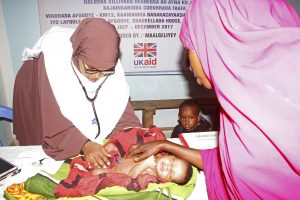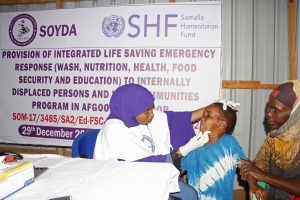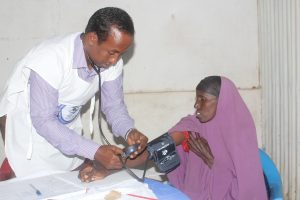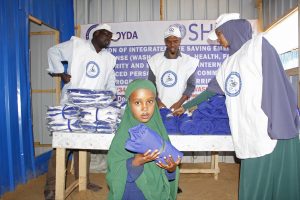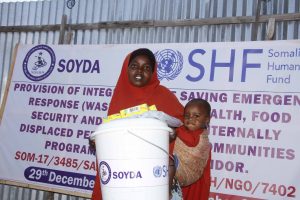The humanitarian situation in Somalia remains critical due to ongoing impacts of drought and conflict. As per the recently released FSNAU-FEWSNET 2017 Post Deyr findings, the situation has not returned to a pre-crisis state. Despite a reduction in the total number of people facing food insecurity, down from 6.2 million in 2017, 5.4 million people are still in need of urgent assistance, including an estimated 2.8 million children. The number of people currently in emergency (IPC 4) stands at 180,000, including over 100,000 children – more than double the amount of people in emergency (IPC 4) in January in 2017, which then stood at 83,000; and projections indicate that 2.7 million people will be in crisis (IPC 3) or emergency (IPC 4) from now to June 2018, as compared to 2.9 million for the same period in 2017. The overall median prevalence of acute malnutrition has improved from Critical (17.4 per cent GAM) in June-July 2017 to Serious (13.8 per cent GAM) in November-December. Urgent treatment and nutrition support is needed for approximately 301,000 acutely malnourished children, including 48,000 who are severely malnourished, Overall, 1.2 million children could be malnourished by the end of the year according to Nutrition Cluster projections. Over 4.4 million people need humanitarian WASH services, with 3.5 out of 5 people without adequate water to meet basic needs. Over 5.7 million people require basic health services, including critical needs in maternal and child health, as one in seven Somali children die before the age of five. Disease outbreaks such as acute watery diarrhea (AWD)/cholera and measles continue to represent a major threat to children, with 78,853 and over 23,000 cases reported respectively in 2017. Crude Death Rates (CDR) and/or Under-Five Death Rate (U5DR) have surpassed emergency thresholds in seven of the population groups surveyed (i.e. CDR > 1/10 000/day and U5DR > 2/10 000/day, respectively). Over 3 million children, out of 4.9 million in country, are estimated to be out of school. More than 2.1 million people have been displaced, including over 1 million in the last year alone. Exclusion and discrimination of socially marginalized groups continue to exacerbate high levels of acute humanitarian needs. More than 76 percent of recorded gender based violence (GBV) survivors are reported to be from IDP communities. Grave violations against children continue at worrying rates, with 402 cases, mostly abductions, recruitment and use, and killing/maiming reported in January 2018. With limited livelihood and coping options and poor living conditions, exacerbated by recent large-scale displacement due to drought, food security and nutrition outcomes across most of the 13 main settlements for internally displaced persons (IDPs) indicated deterioration. Accordingly, most of the IDP settlements are classified as Crisis (IPC Phase 3) or Emergency (IPC Phase 4). Impacted by high food prices, increased completion from displaced populations and localized trade disruptions, poor households in some of the major urban areas of the country face acute food security Crisis (IPC Phase 3).
However, SOYDA have been providing integrated package of nutrition, Food Security, Education, WASH, protection, and health intervention in both Mogadishu IDPs as well as the Afgooye corridor district.
Despite the continuous scale up of the emergency primary and nutrition program the needs on the ground is still growing since there are continuous displacement from areas control by Al Shabab and the rural settlement from Lower Shabelle region and other neighboring middle Shabelle hence increasing the risk of AWD/cholera outbreak compared to the previous months.
SOYDA shall however, continue its program implementation to enable reduce the vulnerability as well as provide improved lifesaving Health, Nutrition, WASH, Food Security, Protection and Education services.
i. Program activity achievement (Jan-March 2018).
The following were some of achievement recorded in this Quarter Jan-March 2018, they includes:
• SOYDA Celebrated commemoration of International Women’s Day, 8th March 2018, through community awareness engagements in Our Project Areas. Our awareness campaign started all our health facilities in Benadir and Lower Shabelle Region which aims to raise community awareness and mobilize people everywhere to bring about change through targeting Community leaders, Youth Symposium and Women entities to discuss the importance of women empowerment and gender equality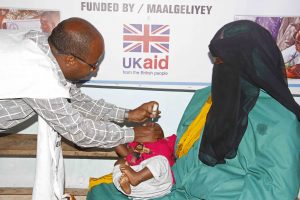
• SOYDA Launched commemoration of International Day of Zero Tolerance for Female Genital Mutilation (FGM), 6 February 2018 through community awareness engagements in Our Project Areas. Our awareness campaign started all our health facilities in Benadir and Lower Shabelle Region which aims to raise community awareness and mobilize people everywhere to bring about change through targeting Community leaders, Youth Symposium and Women entities to discuss the effects of FGM by Providing families and communities with information about the harm FGM causes – and the benefits to be gained by ending it. We encouraged families and communities taking action themselves and refusing to permit their girls to endure the violation of FGM.
• A total of 35,876 number of crisis affected women, children and Men in emergency was reached with improved life-saving primary health care services, However, integration of nutrition, WASH, protection and health have helped the community members have better lifesaving nutrition and health services with easy access to the facilities and mobile sites.
• Through the facility and outreach program sites SOYDA was able to reach a total of 9,321 children under five boys and girls for vitamin A supplementation to enable enhance the vulnerable children nutrition status. This has since be able the program to reach more than 91% of the monthly coverage under five children thus indicating greater progress to the set indicators within the program.
• SOYDA continuously conducting routing immunization in all the project target sites for health and nutrition however, in this reporting months, it was able to reach Routine measles immunization in both the facility base as well as outreach mobile services hence the program have been able to reach a total of
8,634 children. This has since improved the quality of the target beneficiaries in all the program areas.
• Skilled delivery is the core of primary health care services thus the project was able to record success in both facilities and at home visit for the traditional birth attendance hence encourage facility delivery and passed knowledge and information to the mothers in the target areas for safe motherhoods hence this reporting month a total 755 safe delivery were conducted in SOYDA health and Nutrition facilities. This improvement was also attributed closer coordination between the program outreach team as well as community traditional birth attendants in the project areas.
• The project was able to attend to a total of 3,559 pregnant and lactating mother’s antenatal care (ANC 1st visit) in this reporting period and has since completed all the 4 comprehensive ANC visit. The program has recorded success in all reaching the vulnerable mothers with improved maternal health care services in both facilities and outreach sites program.
• On the same reporting period a total of 912 women of reproductive age have received T1-T5. The community health workers are continuously conducting community sensitization and education in the project areas.
• Through this reporting months a total of 3,443 <5 children received penta 1-3 in both the mobile outreach project sites as well as the facility base program sites, this has since provided the target beneficiaries enhance access to feasible emergency integrated nutrition and primary health care services.
• 6,866 Children and PLW were provided acute malnutrition treatment and also provided IYCF and NHHP counseling during this reporting period.
• 678 Hygiene kit distributions were done to the discharged CTC patients.
• On GBV responses, 489 cases were provided STI treatment, basic emotional support and psychosocial support.
• Conducted community mobilization and back to school campaigns in the target areas aimed to retain the learners in the schools and bring the dropouts back to the schools.
• 12th -15th March 2018, conducted 4 days Teachers training on education in emergency and prevention of acute watery diarrhea.
• 22nd -26th Feb 2018, Conducted 5 days training on hygiene promotion awareness sessions on community hygiene promoters and public health workers. The workshop was focusing on 1) overview of hygiene and sanitation and 2) Hygiene promotion campaigns; step by step tools used by participatory hygiene and sanitation transformation activities.
• 08th-12th Feb 2018, Conducted 5 days training on Integrated Management of Acute Malnutrition IMAM for SOYDA 39 Health and Nutrition project staff in order to improve their capacity to advise, refer, and treat malnourished children and pregnant lactating women.
• 27th -31st Jan 2018, Conducted Community Case Management Training for 15 Female and 20 Male to create awareness on common communicable diseases with emphasis on AWD, malaria, maternal health, child and maternal malnutrition through the front line health workers and Community health educators
• 14th -18th Jan 2018, Conducted Community education committees (CECs) training in order to oversee the running, management and administration of the schools.
• Enrolled 200 school aged children with equal share of boys and girls (100 girls and 100 boys) in Gurmad IDP School.
• Provided support school feeding programmes to 500 pupils (200 new children and 300 children already enrolled in the school) to attract parents to allow their children to schools, avoid malnutrition to the pupil and prevent excess dropouts.
• Distributed basic learning and teaching materials for the students and the schools to help them continue their education. The items distributed include exercise books, pen, pencil, sharpeners, erasers, mathematic sets for both teachers and students and mixed color dustless chalk. These materials are intended to contribute to the retention of the children and improved quality of teaching and learning system in the target schools.
• Constructed 3 water kiosks and extended pipelines in Afgooye corridor IDPs and school children site.
ii. Challenges/Constrains.
Some of the bottlenecks experience during this reporting period is as follows:
• Limited funding with high number of beneficiaries in the program sites. This is due to the short time program funding, Particularly the end of SHF and UNICEF Health projects in Daynile, Dharkenley and Mogadishu long corridor IDPs.
• High number of displaced person from drought affected areas and forced evictions at Km13.
iii. Lesson learnt.
The following were some of the lesson learns during this quarterly reporting period.
• Strengthen and improve nutrition communication and advocacy through National and sub national cluster.
